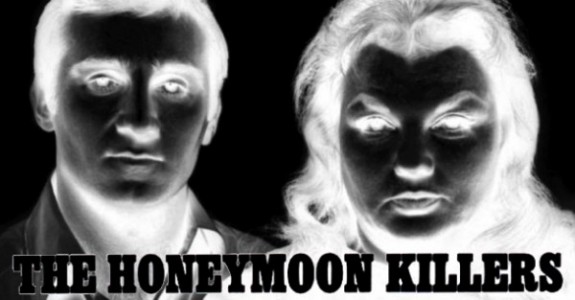

Dir|Wri Leonard Kastle | Cast: Shirley Stoler, Tony Lo Bianco. Mary Jane Higby, Doris Roberts, Kip McArdle, Marilyn Chris, Dortha Duckworth | 107 minutes | US Crime Thriller
Leonard Kastle’s noirish thriller The Honeymoon Killers exposes the disturbing true story of Martha Beck and Raymond Fernandez who were executed for murder at Sing Sing Prison, in March, 1951. The gruesome couple were in some ways the American predecessors of Fred and Rosemary West, except their victims were older women rather than young girls, and their motive was money.
A hard-faced Shirley Stoler plays the obese, frustrated spinster Martha. Cooped up with her needy mother she is embittered by a string of unsuccessful romances and working as a matron in the local hospital when we first meet her, reprimanding a couple of nurses who appear to be canoodling in a cupboard. Desperate for affection, she joins Aunt Carrie’s Friendship Club and strikes up a relationship with Ray Fernandez (Tony Lo Bianco), a darkly handsome smooth-talker who seems too good to be true. And he is. This ‘Mr Nice guy’ is a con man with a sinister past.
Shot in stark black and white and scored with a selection of Mahler’s Symphonies, making an unusual contrast the low-budget indie look The Honeymoon Killers makes for troubling viewing. Kastle who trained as a musician before turning to directing, gradually exposes how the toxic twosome weave a world of murder and malice where lost souls inveigle their prey in a relationship that goes from to strength to strength.
Staying close to the true crime story, Kastle explores the psychopathic pair right up until the trial, proceeding with clarity and precision in a drama that portrays victims and perpetrators as physically and emotionally unappealing. Even Tony Lo Bianco’s good looks gradually pale in comparison to his vile obsequiousness: yet Martha exerts an inexplicable hold over him, despite her physical and personal unattractiveness. Both give stunning performances, the most unsettling aspect of which is not only their ease in switching between charm and coldness but also their magnetic screen chemistry which seems to be at its most potent immediately following brutal behaviour towards their victims: immediately after viciously murdering their final victim, the couple indulge in some grotesque love-making. Violence seems to fire up and fuel their sexual appetite, almost acting as an aphrodisiac.
Martha is a more controlled psychopath than her counterpart Gloria, star of Fabrice Du Welz’s drama Alleluia, a 2014 adaptation that transposes the story to contemporary Belgium. While Stoler is constantly teetering on the edge of insanity with her performance as Martha. Lola Duenas’ Gloria is sexually out of control and completely unhinged with jealousy by her lover Michel’s power over women. In contrast Martha is more enraged by the victims’ emotional closeness to Tony than by the physical rapport he has with them. Tony here appears less keen to develop a relationship with the women, and more dispassionate about their welfare after Martha derails their nascent romance. Her training as a nurse in the early 1950s, enables Martha to be more powerful because of her medical expertise and knowledge of sleeping drugs.
Kastle’s thriller is an intimate-feeling chamber piece with a more clinical, procedural approach than Alleluia, which is an unbridled love story between the two people who end up killing violently because one of them (Gloria) becomes uncontrollably jealous of the other’s motives. In The Honeymoon Killers there is never any doubt about Martha’s confidence and mastery of Tony. Oliver Wood’s front-lit camerawork gives the film a strange visual allure despite its ugly subject matter.
Where The Honeymoon Killers suffers slightly is with its sound recording – odd with Kastle being a composer – possibly due to a low budget. None of the cast were big screen stars: Lo Bianco coming from a TV background had just filmed Star! with Julie Andrews, and Stoler was making her screen debut at the ripe age of 40. MT
NOW OUT ON DVD | BLU-RAY COURTESY OF ARROW FILMS AND VIDEO | INTERVIEWS WITH FABRICE DU WELZ (ALLELUIA 2014) | TODD ROBINSON (LONELY HEARTS 2006)